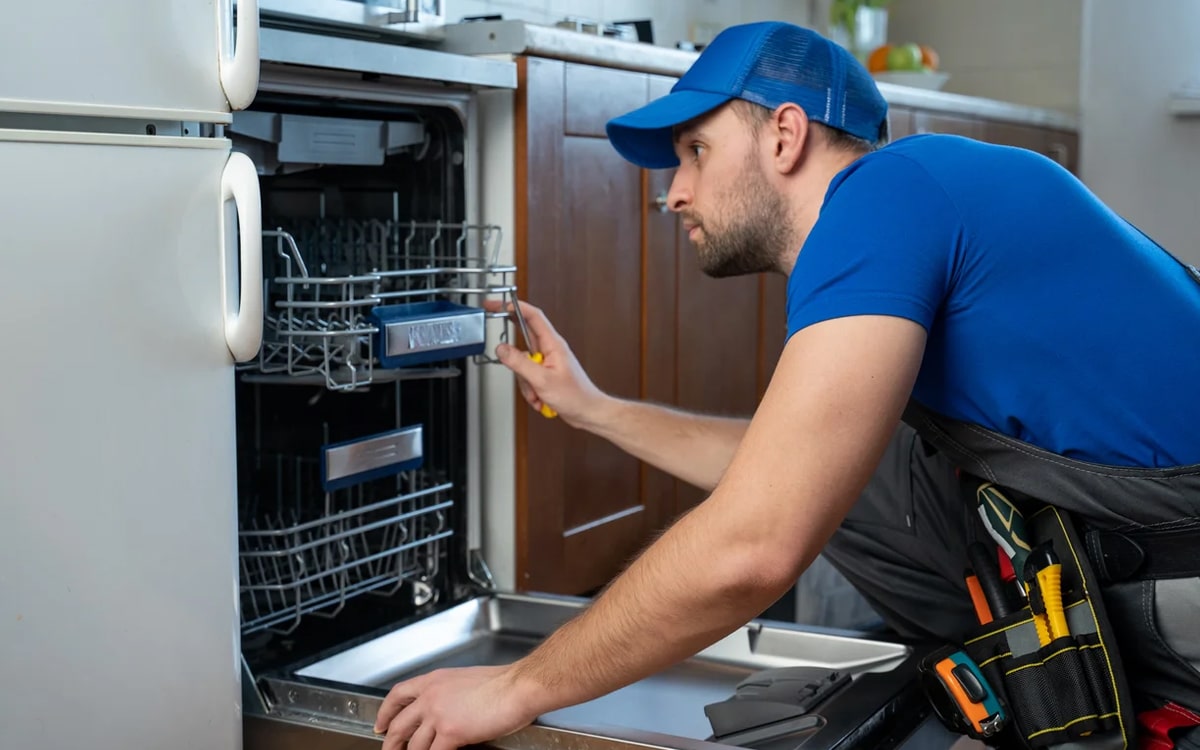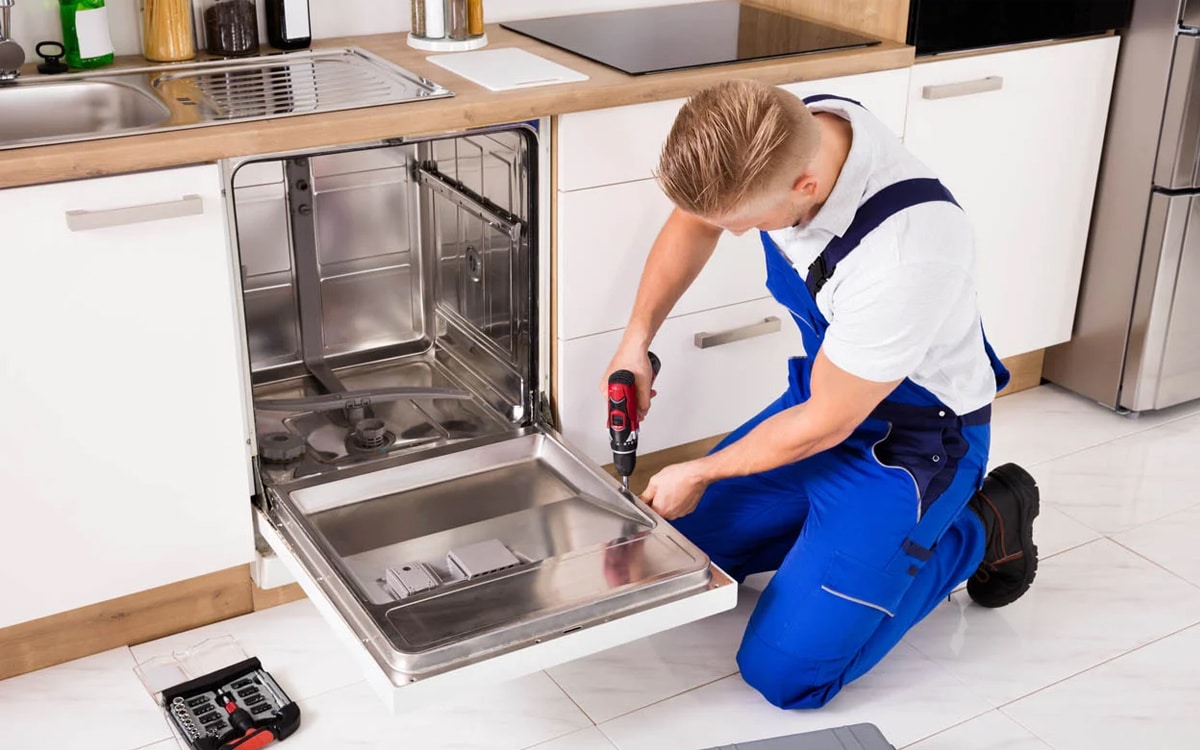You might initially feel confident about installing your new dishwasher by yourself. But when you consider that a dishwasher needs to be hooked up to electricity and a full water supply, you might wonder whether it’s worth contacting a professional to help you out.
In particular, you might wonder whether a dishwasher should instead be installed by a plumber. Is it better to take a back seat, and let a qualified plumber take the task on? Is it more safe this way?
Unsure whether to pay that little bit extra for a plumber? Let’s find out whether it’s necessary!
Should A Dishwasher Be Installed By A Plumber?
Let’s start right off the bat by saying that, yes, dishwashers should be installed by plumbers. While it is technically possible to install a dishwasher entirely by yourself, it would require a lot of specialist knowledge. Tackling a dishwasher installation haphazardly could result in a damaged dishwasher, or even flooding in your kitchen!
Dishwashers need to be fully plumbed in to make use of your home’s water supply and drainage systems. This can require a lot of knowledge and experience, to ensure it’s hooked up correctly. Attempting to mess around with your plumbing with no experience is a great way to end up with a flooded kitchen!
It’s not a requirement to have your dishwasher installed by a plumber. However, it is strongly recommended. A plumber will be able to fully install your dishwasher so that there are no unexpected issues during use!
While it might be initially frustrating to have to fork over money for a professional installation, it will save you a lot of peace of mind. Once it is professionally installed, you can use your new dishwasher with confidence. Installing a dishwasher incorrectly will result in expensive repairs that may cost you far more than a professional installation!
Should A Dishwasher Be Installed By An Electrician?
Most dishwashers can be hooked up directly to the nearest power outlet, safely, and without hassle. In some cases, you will need to install a new dedicated circuit for your dishwasher. Either way, we strongly recommend contacting an electrician.
Dishwashers use both water and electricity to do their job. If managed incorrectly, these two can create a very lethal combination. An electrician will be able to safely and fully hook your dishwasher up to a power supply.
Again, it might cost a little bit extra, but it’s worth doing.
Does A Dishwasher Need To Be Installed Next To A Sink?
A dishwasher doesn’t technically need to be installed next to the sink. However, it is an incredibly convenient option that many people opt for. By installing near the sink, your dishwasher can be hooked up directly to the existing plumbing. This is much more convenient and helps to save a lot of money. Having the dishwasher near the sink also makes it much easier to load it up.
Dishwashers can be installed anywhere in your kitchen, but it’s easiest to place them close to your sink. This allows the dishwasher to be connected to your existing plumbing for easier installation.
If you don’t wish to have your dishwasher installed near the sink, it could cost extra to have it installed. If you choose a spot that does not have existing plumbing, then you will first need to have it installed!

How Do You Choose The Right Spot For A Dishwasher?
Generally, the best place for a dishwasher is near your kitchen sink. This is usually the heart of the kitchen, and where many of your essential appliances are found. By having a dishwasher closer to the sink, it’s much easier to load it up. You won’t have to carry messy dishes across the kitchen just to put them in place. As we mentioned, proximity to the kitchen sink is also beneficial for easy integration with existing plumbing.
You’ll also want to make sure there is a suitable area in the kitchen for the dishwasher to be placed. You’ll need to ensure that the dishwasher fits snuggly into place, to not disrupt the aesthetic of the kitchen, while also ensuring there is enough breathing room for the unit. Placing your dishwasher too close to other appliances or fixtures can result in it vibrating and creating noise while in use.
Frequently Asked Questions
Should A Dishwasher Be Installed By A Plumber?
We recommend that you contact a plumber to assist with installing your dishwasher. Installing your dishwasher requires more than simply shifting it into place. You also need to ensure it’s hooked up to your home’s plumbing. Without the required knowledge, doing this by yourself could easily result in a flooded kitchen or an irreparably damaged dishwasher!
Does A Dishwasher Need Its Own Plumbing?
No. This is why so many people install their dishwashers beside the kitchen sink. A dishwasher can easily be hooked up to your existing kitchen plumbing, to help save a lot of time and money. You can install your dishwasher anywhere in the kitchen, but you will need to connect it to your home’s plumbing system. This could cost a lot more.
Can I Run A Washing Machine And Dishwasher On The Same Socket?
No. Washing machines and dishwashers need a lot of electricity. As a result, they also need to run on their own dedicated circuits. Powering up your dishwasher and washing machine on the same circuit could very easily lead to a power overload. Dishwashers and washing machines should have their own fuses in your home’s central fuse box.
Why Can’t You Use An Extension Cord With A dishwasher?
You should avoid using an extension cord to power your dishwasher. Powering your dishwasher with an extension cord can be incredibly dangerous, as the extension cord may overheat. Don’t forget that dishwashers use up a lot of power. As such, it’s best to plug your dishwasher in directly, without making use of extension cables. It’s even better if you can wire it directly to your home.





